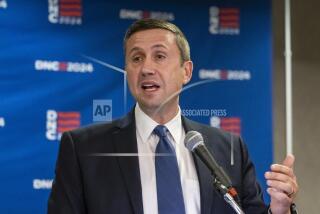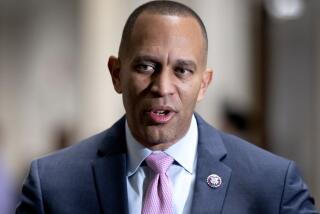Communist Wins Duma Leadership
- Share via
MOSCOW — Russia’s new lower house of parliament elected a leader of the resurgent Communist Party as its chairman Wednesday, ousting the incumbent who had broken with the party to become an ally of President Boris N. Yeltsin.
Gennady N. Seleznyov, a former editor of the Communist newspaper Pravda, won the post with support from 231 of the Duma’s 450 members on the second day of voting and the third secret ballot.
His election turned the Communists’ 22% plurality in the Duma election a month ago into a national leadership role that will endure whether Yeltsin seeks and wins reelection in June. The Duma chairman serves a four-year term.
Seleznyov immediately called for a truce between the Communist opposition and Yeltsin.
Yeltsin, a former Communist Party member, engineered the breakup of the Soviet Union and has devoted much of his presidency to burying Communist ideology with a tide of free-market reform.
Speaking after his election, Seleznyov noted that Yeltsin had bowed to the Dec. 17 popular vote and swept the last radical market reformer, First Deputy Prime Minister Anatoly B. Chubais, from his government on Tuesday.
Seleznyov said the Communist Party, “at least tomorrow,” will not call for a vote of no-confidence in Yeltsin’s government.
“We believe that Chubais’ resignation and the president’s statement stressing the need to immediately begin paying [overdue] wages and pensions sets a positive trend and gives hope that the president and the government are turning their reforms toward the majority of the population,” he said. “The Communists will not dictate their conditions where a compromise is possible.”
For now, the Communist line means that there will be no parliamentary censure of Yeltsin’s indiscriminate artillery barrage against separatist rebels from breakaway Chechnya who are holding dozens of hostages in the southern Russian village of Pervomayskaya.
Instead, the Duma limited itself Wednesday to a vague resolution demanding “adequate measures” to stop “extreme forms of terrorism” by the Chechens.
No one expects the political truce to last. Many deputies predicted that Communist lawmakers, whose party is maneuvering to capture the presidency in June, will try to force the government to backtrack on its reforms as far as possible without trying to bring it down.
“The perfect position for the Communists is to keep the situation around the government in high tension, to keep criticizing without losing the target of their criticism,” said Alexander Shokhin, a lawmaker and former deputy prime minister in the Yeltsin government.
The new parliament is the third of the Yeltsin era.
Yeltsin won a bloody battle against the holdover Soviet-era parliament by blasting its headquarters with tanks in October 1993. The second parliament, elected two months later, was just as hostile, but a constitution passed by the voters at the time gave the president far more power.
Yeltsin used his power to co-opt Ivan P. Rybkin, a Communist who had left the party in a tactical move to set up the like-minded Agrarian Party and who was chosen Duma chairman after the 1993 election.
Given a seat on Yeltsin’s Security Council, Rybkin worked to keep the Duma in line and ran for reelection last month on a pro-Yeltsin ticket.
Rybkin got 150 votes Wednesday in his bid to retain the post of Duma chairman. He was backed by pro-Yeltsin blocs and the party of ultranationalist Vladimir V. Zhirinovsky, who had dropped out of the race.
Arguing against the election of a Communist, pro-Yeltsin lawmaker Sergei Belayev said the chairman’s powers might be used “to create a party dictatorship.”
But Seleznyov promised before the vote to rotate the chairman’s duties with elected deputies from other parties.
He won with the Communist Party’s 157 votes, along with those of about 50 fellow socialists.
At 48, the new Duma chairman is the youngest member of the Communist Party’s inner circle.
A native of the Sverdlovsk region of the Ural Mountains, Seleznyov joined the party at 23 while serving in the Soviet army. He earned a journalism degree at Leningrad State University and served as a Communist Youth propagandist and editor.
Seleznyov was Pravda’s editor in chief from 1991 until his election to the Duma two years later.
More to Read
Sign up for Essential California
The most important California stories and recommendations in your inbox every morning.
You may occasionally receive promotional content from the Los Angeles Times.













